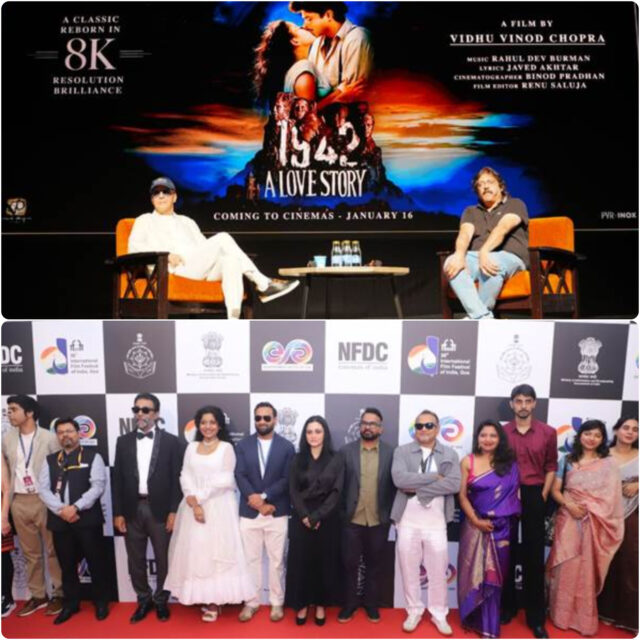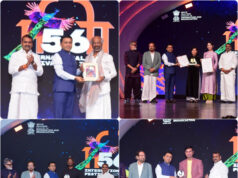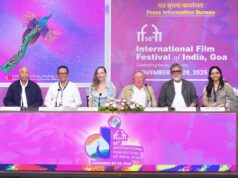The International Film Festival of India (IFFI) today hosted a series of insightful masterclasses featuring renowned filmmakers, performers, and global festival leaders who engaged audiences in deep discussions on creativity, performance, and the evolving future of cinema.
The sessions brought together filmmaker Vidhu Vinod Chopra with writer Abhijat Joshi, Tricia Tuttle, Festival Director of Berlinale, in conversation with Shekhar Kapur, Festival Director of IFFI, and theatre guru Vinayakumar of Adishakti.
Opening the conversation, Abhijat Joshi reminisced about the very first day he met Vidhu Vinod Chopra, a November day he remembers vividly, a moment that eventually shaped films like ‘Lage Raho Munna Bhai’ and ‘3 Idiots’. He then asked Chopra if his style had evolved from ‘Parinda’ to ‘12th Fail’. Chopra’s answer was as raw as it was revealing.
“Every film reflects who I am at that point,” he said. “I was angry when I made ‘Parinda’. You can see that violence in the movie. Today I’m calmer.”
He added that ‘12th Fail’ came from witnessing corruption around him. “The film was my way of saying let’s be honest for a change. If I can change even 1% of the bureaucracy, that’s enough.” He also shared how watching ‘1942: A Love Story’ in its newly restored 8K version made him emotional. It was a film, he said, he could not make today because he is no longer the same person.
The session began on a warm, personal note as Shekhar Kapur congratulated the festival for dispensing with plastic bottles, while Tricia Tuttle recalled a moment from 1998 when, as a young film school graduate, she attended Shekhar Kapur’s masterclass on his film Elizabeth. “It feels full circle,” she said, setting a tone that blended past experiences with the unfolding future of cinema.
Throughout the session, Shekhar Kapur repeatedly stressed that no matter what technology arrives, whether digital tools or AI, cinema survives because human imagination survives. He emphasized that it is the creator who ultimately directs any new tool, reminding the audience that no innovation can outgrow the creativity of the people who use it.
Tricia Tuttle reflected on earlier anxieties around technological shifts, recalling how the advent of digital filmmaking once sparked fears that cinema would disappear. “But what endures is the idea, the craftsmanship, the humanity,” she said. Shekhar Kapur added that no matter how advanced AI becomes, it cannot understand the delicate emotional micro-variations a great actor brings to a frame, especially the subtle changes in the eyes. “AI doesn’t understand pupils,” he noted, adding that the emotional spark is what truly binds an audience to a story.
Shekhar Kapur also shared a teaser of his AI-created series, War Lord, speaking with the enthusiasm of someone exploring new creative tools. Even while embracing these possibilities, he grounded the conversation in his belief that technology does not redefine the storyteller; rather, the storyteller reshapes technology.
These interactions provided participants with a rich understanding of filmmaking craft, emotional performance, and the impact of emerging technologies such as AI on storytelling and festivals.
IFFI also presented a distinguished slate of International Gala Premieres, bringing acclaimed global cinema to festival audiences. The lineup featured the Italian–Swiss film Mosquitoes, the restored English classic Muriel’s Wedding, and the French title Renoir from the International Competition, offering viewers a compelling blend of contemporary narratives and celebrated cinematic artistry.






